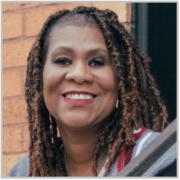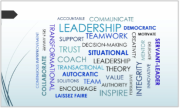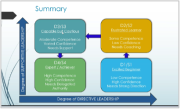Written by: Catherine Binuya, Ed.D.
Presentation Overview 
Cheryl Bennett is PMO Director of New Wave Technologies (https://newwave.io/) and Owner of Just Swim Consulting (https://www.justswimconsulting.com/) a leadership training and
personal development company. Cheryl led the AEC Forum in a discussion of the application of Situational Leadership, a theory developed by Ken Blanchard and Paul Hersey. Situational Leadership Theory articulates how leaders can vary their leadership approach to directiveness and support according to a team member’s level of work competency and confidence in completing a task.
Takeaways
- Four (4) Development Levels of a Team Member
- D1- Excited Beginner: characterized by low competency, high confidence
- Traits: Inexperienced, curious, optimistic, eager
- Needs: Give them clear goals, rules & directions, step-by-step guidance, frequent feedback, positive reinforcement, concrete examples
- D2- Frustrated Learner: characterized by higher competency, lower confidence
- Traits Some competence, confusion, discouraged, overwhelmed, demotivated
- Needs: Encouragement, support and reassurance, advice, coaching, give perspective and help analyze mistakes
- D3- Capable/Cautious: characterized by moderate competency, moderate confidence
- Traits: Contributors, self-critical, cautious, insecure
- Needs: Sounding board, validation, encourage them to problem solve solutions, confidence building, remind them of past successes
- D4- Expert/Achiever: characterized by high competency, high confidence
- Traits: SMEs, inspired and inspiring, autonomous, self-directed/self-reliant/self-assured
- Needs: Acknowledgement, appreciation, trust, challenge growth, autonomy, opportunities to teach and mentor other members
- D1- Excited Beginner: characterized by low competency, high confidence
- Four (4) corresponding Leadership Styles associated with each Development Level of working team member
- S1- Directive: characterized by high direction, low support “Tell them what to do”
- S2- Coaching: characterized by high direction, high support “Coach them on what to do”
- S3- Supportive: characterized by low direction, high support “Encourage them on what to do”
- S4- Delegator: characterized by low direction, low support “Challenge them on what to do”
Next Event
Join us at the next PMI Atlanta Architectural, Engineering, & Construction (AEC) Forum on December 13, 2022
Keynote Presenter: Yvonne Dragon, Co-Founder, COO, Chief Strategist of the Dragon Group
Register at www.pmiatlanta.org/events/event-calendar
Event Pictures



